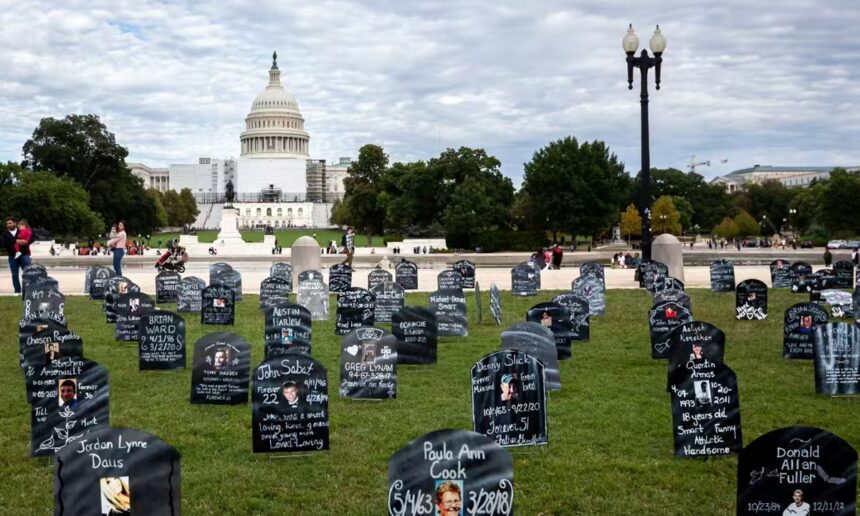Editor’s Note:
China has carried out extensive and in-depth counternarcotics cooperation with the US. However, despite this fact, the US has blamed China for the prevalence of fentanyl on US soil, a move that undermines China’s goodwill and the cooperative atmosphere between the two countries. How should the US view its own crisis? Is blaming China a far-fetched solution? The Global Times (GT) collects opinions from Chinese and American experts to discuss this issue.
In the fifth installment of the series, GT reporter Wang Wenwen spoke to US drug abuse interventionist Tim Ryan (Ryan) over these issues. Ryan, who was once a drug addict, got clean and set up the “A Man in Recovery” foundation after spending 13 and a half months in prison. He said that people don’t find the China-blaming convincing. “It’s easier to blame other people instead of saying we made a big mistake or we are doing this wrong,” Ryan noted, urging the US government to take up more responsibilities to tackle its fentanyl issue.
GT: How do you view the situation of drug abuse, especially fentanyl, in the US now?
Ryan: It’s just getting worse. Today would have been my son’s 31st birthday. He died 11 years ago from heroin and fentanyl. I just had another friend die last Thursday night from fentanyl. He was 52 years old. Fentanyl is at an all-time high, and it’s everywhere.
For Americans aged 18 to 45, the leading cause of death is fentanyl overdose. A lot of the people that are dying don’t realize they’re taking fentanyl. They might smoke some high-grade marijuana. Their inhibitions are dropped, and someone gives them a pill. They try it. It’s fentanyl. Once they get addicted to it, they can’t live without it. And it will ultimately kill them. I don’t know many successful fentanyl addicts who have turned their lives around, unfortunately. It is destroying America.
GT: What reasons do you think are behind the prevalence of drugs in the US?
Ryan: The prevalence of drugs in the US is crazy. The US wants to give you a drug for everything. We’ve raised a society here that needs to take something to feel better instead of prayer and meditation or something else. We’re all about alcohol, marijuana, prescription pain pills, and obviously, cocaine and fentanyl. A lot of it has to do with our media that’s always pushing all these drugs on people. Our laws are very lax on people selling drugs.
There’s too much corruption in our government. There’s law enforcement that’s paid off. There are politicians who are paid off. That’s a problem. It’s all about the money. Why haven’t we eradicated the drug cartels? Why haven’t we sent in our Navy SEALs and our special forces to go after the drug cartels?
Another prevalence was our open borders that the Biden administration let happen. And when you’re letting millions of people come across the border, mass quantities of drugs will come across the border, too. On the drug deal side, a lot of the big drug dealers float under the radar. You don’t know who they are. You don’t know where they are. Unfortunately, they’re taking advantage of minority families in crisis situations to bring the drugs across the border. And people aren’t afraid to sell them.
We need tougher laws. If you’re distributing fentanyl, you should be charged with drug-induced homicide. You go to prison for decades. We don’t have laws like that.
GT: The US government blames China for the abuse of fentanyl-like substances in the US and some politicians even threaten to impose tariffs on China because of the fentanyl crisis. What do you think of such rhetoric? How convincing is it to the American public?
Ryan: We need so much change here in the US. We just don’t have it right now. China should be treated as our partner. With the tariffs put in place, it’s ultimately going to harm US citizens because our costs are going to go up. I don’t think our government understands how deep the fentanyl drug cartel is. It’s everywhere. The entire system needs to be changed, and we need to stop pointing the finger. We need to start bringing solutions to the table. If people veer off, we need to hold people accountable.
People don’t find the China-blaming convincing. People look at the big picture with China and what they’re doing and what they’ve done, and they realize that blaming China is the wrong thing to do.
It’s easier to blame other people instead of saying we made a big mistake or we are doing this wrong. It’s much easier to blame people and that diverts away from the problem. It might divert away for a couple of months, but the problem is not going away.
The bottom line is we cannot blame everybody. Nobody forced me to drink or to do drugs. I chose to do that. But what I didn’t know how to do was put my hand up and say I needed some help, because of my ego and my pride. If you’re struggling, put your hand up and ask for help.
GT: Some believe that blaming external factors for internal causes is a sign of government incompetence. Do you agree with it?
Ryan: There’s definitely incompetence in the government in a lot of areas. I try to stay out of the politics. We don’t want to bash our partners like China. They are the last countries that we want to be tit-for-tat with, but we want to help each other because we’re losing too many American citizens to fentanyl.
GT: What would be your suggestion to the US government to combat the war on drugs?
Ryan: My suggestion would be, first, we need to make tougher laws. If you’re distributing fentanyl, it’s life in prison. If you sell fentanyl and someone dies, it’s 30 years to life. We don’t have strong enough laws in place to deter people from selling drugs. But we also need to secure our border. We need to quit blaming everybody else, and put together more solutions for people who are struggling to get long-term help here. The average treatment center in the US is 30 days. So, if I’m a 56-year-old man who’s been using fentanyl for 10 years, 30 days of treatment is not enough. I’m going to need a lot more time. Billions of dollars that were given to other countries to fight wars we are not even involved in needs to be allocated to building long-term inpatient detox, residential, substance abuse and mental health programs with long-term structures, sober living, job skills and so on. That way people can have a year to really get their life back and transition back into society. That’s what I would do.











